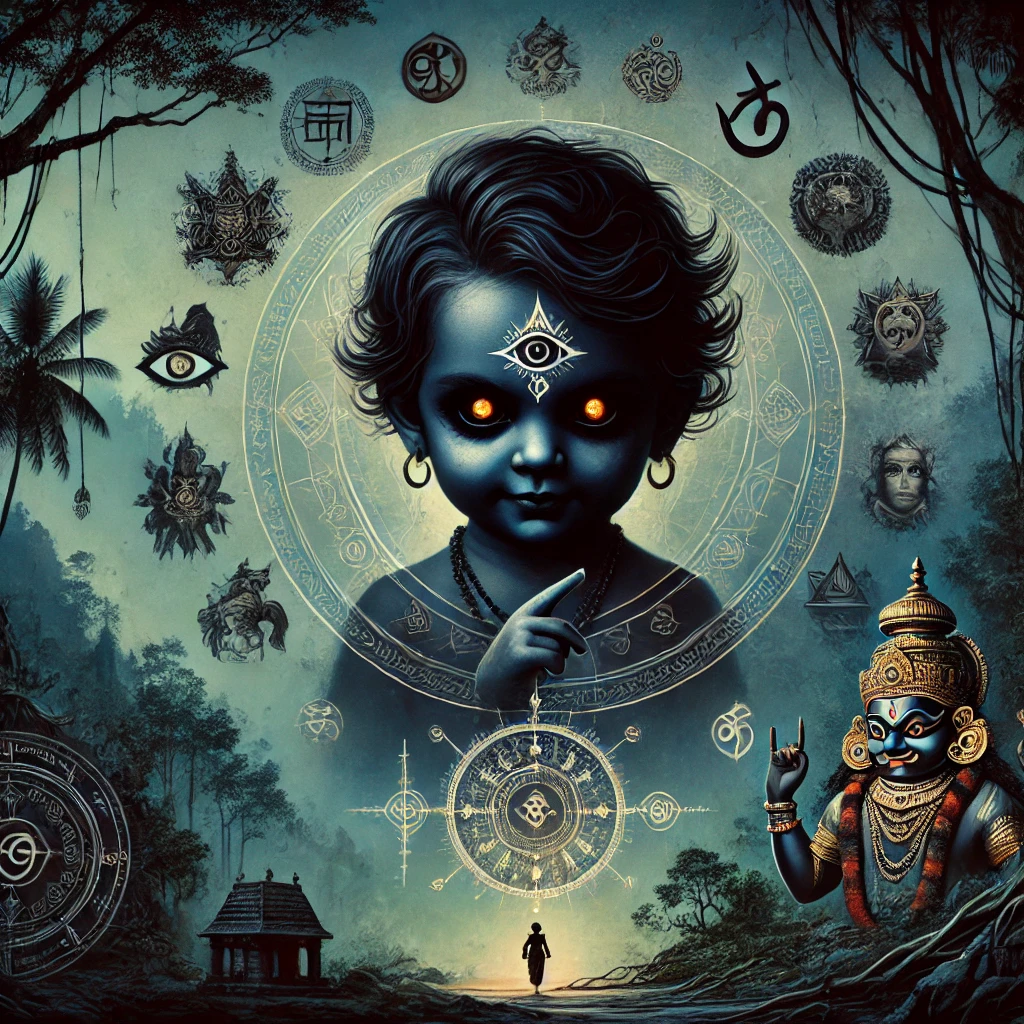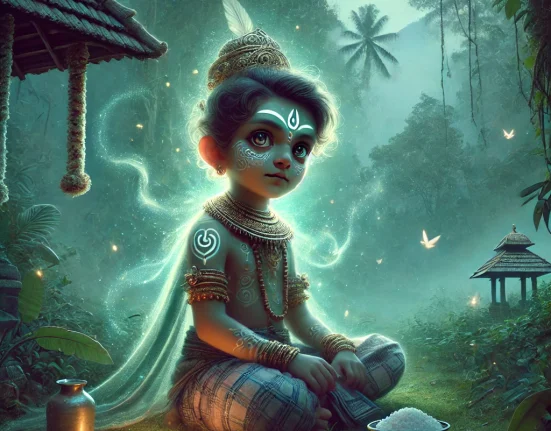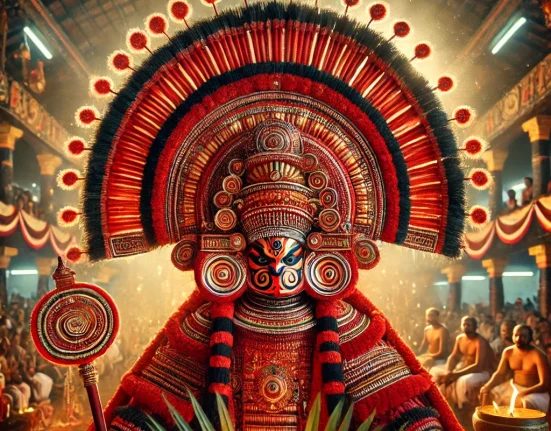In the rich tapestry of Hindu mythology and folklore, few figures capture the imagination as vividly as Kuttichathan. This mysterious being, often associated with black magic and mystical practices, has been the subject of awe, fear, and reverence for centuries. But who is Kuttichathan, and why does this character hold such a potent place in the cultural and religious consciousness of South India? In this blog, we delve deep into the identity of Kuttichathan, exploring his roots, associations with Tantra and Vishnu Maya, his connection to black magic, and the fascinating stories surrounding him.
The Origins of Kuttichathan
Kuttichathan, often translated as “little ghost” or “child spirit,” is a supernatural being deeply rooted in South Indian folklore, particularly in the state of Kerala. Unlike other mythological beings in Hinduism, Kuttichathan is not a deity but a demon-like entity believed to possess significant supernatural powers. According to local traditions, Kuttichathan is a mischievous and capricious spirit who can either bring good fortune or cause chaos, depending on how he is treated.
While Kuttichathan’s origin stories vary, one of the most widely accepted beliefs is that he is a manifestation of Vishnu Maya, a fierce and protective form of Lord Vishnu. Vishnu Maya is considered a guardian deity, and Kuttichathan, as a form of Vishnu Maya, is believed to act as a protector against evil forces. Yet, despite this divine connection, Kuttichathan is often invoked in association with black magic rituals, which creates a complex and somewhat contradictory image.
Kuttichathan and His Connection to Black Magic
One cannot explore the topic of Kuttichathan without addressing the pervasive association with black magic. In Kerala’s traditional lore, Kuttichathan is often summoned by practitioners of Tantra, a mystical form of Hinduism that involves rituals, mantras, and invocations aimed at harnessing supernatural powers. While Tantra itself is not inherently evil, its use in black magic rituals—often referred to as “Chaathan Seva” or the service of Kuttichathan—has painted a darker picture of this entity.
In Chaathan Seva, individuals seek to gain control over Kuttichathan through tantric rituals and mantras. Once invoked, Kuttichathan is believed to serve the person who has summoned him, carrying out their wishes, which may include bringing wealth, success, or, more ominously, causing harm to their enemies. These practices, though secretive and controversial, have kept Kuttichathan firmly linked to the world of black magic and superstition.
Interestingly, while Kuttichathan can be a harbinger of mischief and destruction, those who venerate him with devotion claim that he can bring great benefits, including prosperity, protection, and spiritual insight. This dual nature—both benevolent and malevolent—makes Kuttichathan a figure of both fear and fascination.
The Influence of Vishnu Maya
As mentioned earlier, Kuttichathan is closely associated with Vishnu Maya, and understanding this connection is essential to fully grasping the character of Kuttichathan. Vishnu Maya is a fierce and protective deity who is believed to have the power to destroy evil forces. In many parts of Kerala, Vishnu Maya is worshiped with deep reverence, and his shrines are often located in forests or remote areas where rituals are performed to appease him.
Kuttichathan, as an aspect of Vishnu Maya, is thus seen as a guardian spirit. While the practices involving Kuttichathan may include black magic, there is also a strong belief that he can act as a protector of households and families, keeping evil spirits at bay. This protective nature links Kuttichathan to the Tantric traditions of invoking spiritual beings for both personal gain and protection against darker forces.
The duality of Kuttichathan’s nature is central to his mythos. On one hand, he is linked to the powerful and protective Vishnu Maya, but on the other hand, he is often summoned for purposes that veer into the realm of black magic and manipulation.
Kuttichathan in Popular Culture and Real-Life Experiences
Kuttichathan is not just a figure confined to ancient texts or oral traditions; he has made his way into popular culture as well. Movies, stories, and local plays in Kerala often depict Kuttichathan as a mischievous, child-like figure who can wreak havoc but also bring joy and fortune to those who treat him with respect. The 1984 Malayalam film “My Dear Kuttichathan,” which was India’s first 3D film, played a significant role in popularizing the image of Kuttichathan as a magical, playful entity who is both endearing and dangerous.
But Kuttichathan’s influence extends beyond the realm of entertainment. Many locals in Kerala recount personal experiences or stories from relatives who claim to have had interactions with Kuttichathan. These stories often involve instances where Kuttichathan has either helped them find lost items, caused poltergeist-like disturbances, or even protected them from harm. In such tales, Kuttichathan is described as an unseen presence who can be summoned through specific mantras and rituals.
The Role of Mantras and Tantra in Summoning Kuttichathan
The process of invoking Kuttichathan is deeply rooted in Tantric practices. Which involve the recitation of powerful mantras. These mantras are considered sacred and, when used correctly, can summon spiritual entities like Kuttichathan. However, these rituals are not to be taken lightly. As they are often shrouded in secrecy and come with their own risks.
In the world of Tantra, invoking Kuttichathan is seen as a way to control supernatural forces for one’s benefit. However, there are warnings about the dangers of misusing these powers. Those who summon Kuttichathan without the proper respect or knowledge risk being cursed or falling victim to the very forces they sought to control. This underscores the precarious balance between seeking power and maintaining humility in the face of spiritual forces.
Alternative Perspectives: Is Kuttichathan Just a Myth?
While belief in Kuttichathan remains strong in certain parts of South India. There are alternative perspectives that view him as a symbol of superstition and fear rather than a real spiritual entity. Skeptics argue that Kuttichathan is a product of cultural and religious imagination. Fueled by folklore and the human tendency to attribute supernatural explanations to unexplained phenomena.
From this perspective, Kuttichathan’s role as a mischievous spirit could be seen as a metaphor for the uncertainties and unpredictability of life. Particularly in rural areas where superstition plays a significant role in everyday life. For these individuals, the stories of Kuttichathan serve as cautionary tales or as an outlet for societal fears rather than as evidence of actual supernatural occurrences.
Final Thoughts: The Continuing Relevance of Kuttichathan
Despite the varied interpretations of Kuttichathan—ranging from protector to trickster. From divine manifestation to black magic servant—his significance in South Indian culture cannot be denied. Whether he is seen as a manifestation of Vishnu Maya. A symbol of supernatural power, or simply a character of myth, Kuttichathan continues to inspire awe, fear, and devotion.
For those interested in the deeper spiritual practices of Tantra and mantras. Kuttichathan represents a doorway to a world where magic and the divine intertwine. His dual nature as both protector and mischievous spirit offers a fascinating glimpse into the complexity of Hindu mythology and the enduring allure of mystical forces.
In the end, Kuttichathan is more than just a character in folklore—he is a symbol of the power, mystery, and unpredictability that lies at the heart of the spiritual world. Whether revered or feared, he serves as a reminder that the line between the seen and unseen. The ordinary and the supernatural, is often much thinner than we might think.
By exploring the enigmatic figure of Kuttichathan, we uncover a rich blend of spirituality, mystery, and ancient practices that continue to captivate audiences today. His associations with Vishnu Maya, Tantra, mantras, and black magic offer a multifaceted view of this intriguing being. One that continues to play a significant role in the spiritual landscape of South India.




Leave feedback about this